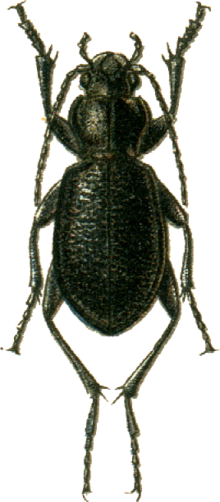
Carabus auratus, the golden ground beetle, is a species of ground beetle in the genus Carabus. This species is native to central and western Europe and has been introduced into North America.

Carabus intricatus, the blue ground beetle, is a species of ground beetle found in Europe.
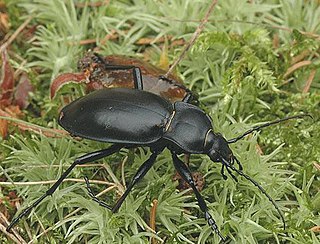
Carabus is a genus of beetles in family Carabidae. The genus is highly diverse with 94 subgenera, 959 species and 2300 subspecies, thus is the largest genus in the subfamily Carabinae. The vast majority are native to the Palearctic, but 16 Nearctic species are also known. Carabus spp. are 12–50 mm (0.47–1.97 in) long, and most species are wingless and often very colourful. These are nocturnal, predatory beetles that feed on snails, earthworms, and caterpillars. Most Carabus species were thought to have inhabited the Eurasian forest, but the species' low dispersal abilities altered the distribution of lineages within the genus.
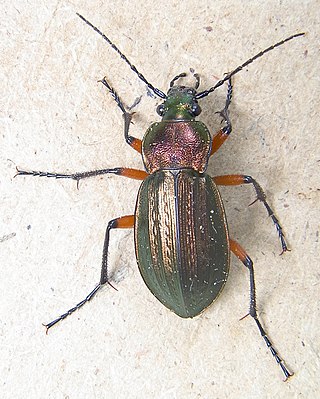
Carabus arcensis is a species of ground beetle in the family Carabidae. It is found in the Palearctic.

Carabus auronitens is a species of beetle in family Carabidae which was described by Johan Christian Fabricius in 1792.

Carabus smaragdinus is a species of beetle belonging to the family Carabidae.

Carabus violaceus, sometimes called the violet ground beetle, or the rain beetle is a nocturnal species of a beetle, from the family Carabidae.

Carabus gigas is a species of beetles of the family Carabidae.
In the 10th edition of Systema Naturae, Carl Linnaeus classified the arthropods, including insects, arachnids and crustaceans, among his class "Insecta". Insects with hardened wing covers were brought together under the name Coleoptera.
Hervé de Toulgoët was a French entomologist. He specialised in moths of the families Arctiidae and Zygaenidae. He also studied the beetle genus Carabus. He was written about by Paul Thiaucourt and Jocelyne Navatte.
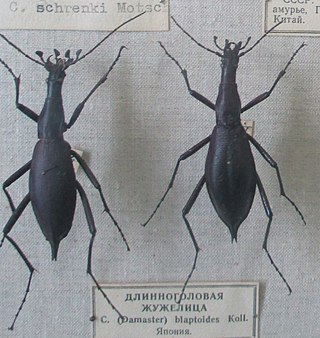
Carabus blaptoides is a species of ground beetle in the family Carabidae that can be found in Japan and Russia. The species are black coloured, but could have either purple or green pronotum.
Carabus exiguus is a species of black-coloured ground beetle in the Carabinae subfamily that is endemic to China.

Carabus hummelii is a species of ground beetle in the family Carabidae. It is found in China, North Korea, Russia, and Mongolia.
Carabus marietti is a species of ground beetle in the Carabinae subfamily that can be found in Bulgaria, European part of Turkey, and Near East.

Carabus sylvestris is a species of either black or brown-coloured ground beetle in the Carabinae subfamily that can be found in Austria, Czech Republic, Hungary, Italy, Liechtenstein, Poland, Romania, Slovakia, Slovenia, Ukraine, and the Netherlands.
Carabus maurus maurus is a subspecies of beetle from the family Carabidae, found in Armenia, Georgia, and Turkey. The species are black coloured.
Carabus maurus osculatii is a subspecies of beetle from family Carabidae, that is endemic to Iran. The species are steel coloured, and are named after its discoverer Gaetano Osculati.
Carabus albrechti is a species of either black or brown coloured ground beetle in the subfamily Carabinae that is endemic to Japan.

Albunea carabus is a rare species of "sand crab" or "mole crab" in the genus Albunea. It lives in shallow, turbulent waters in sandy areas of the tropical eastern Atlantic Ocean and the Mediterranean Sea.
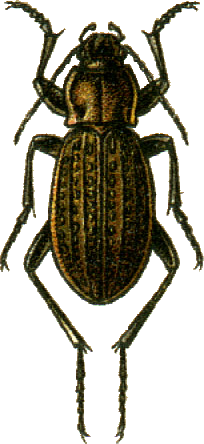
Carabus maeander is a species of beetle in the family Carabidae. The species fly in May and June, are black in colour and 15 to 23.5 millimetres long. It is found in northeastern United States and both central and southern Canada. The species is also found outside of North America. In Russia, it is found in eastern Siberia while in Japan it is known from Hokkaido and Kunashir Islands. It also exists in South Korea.
